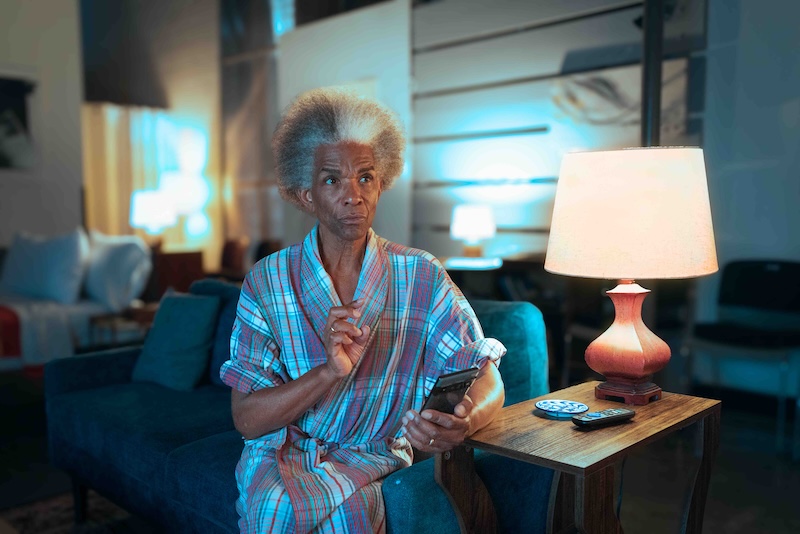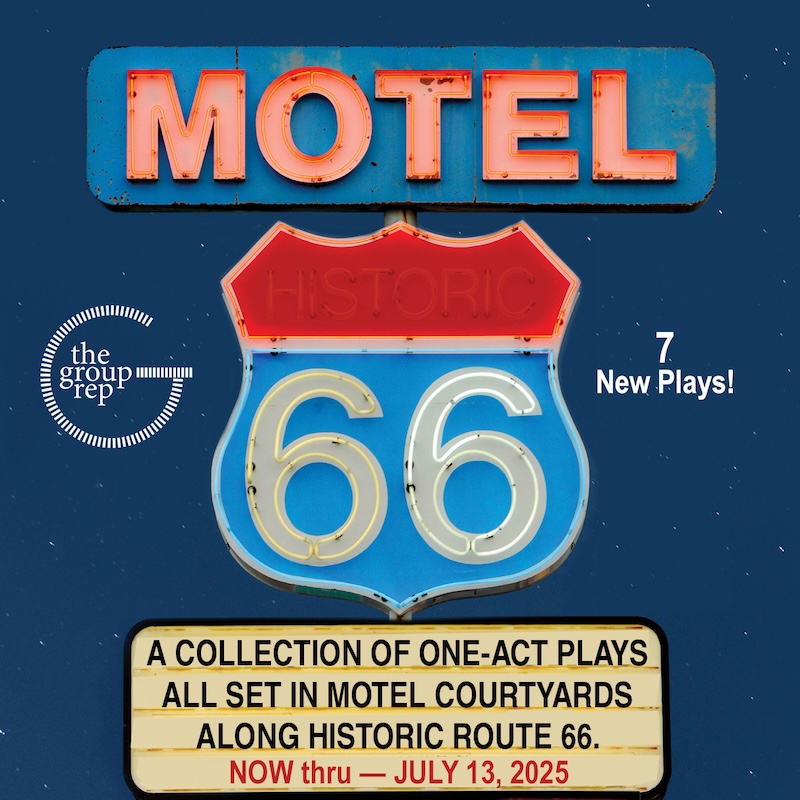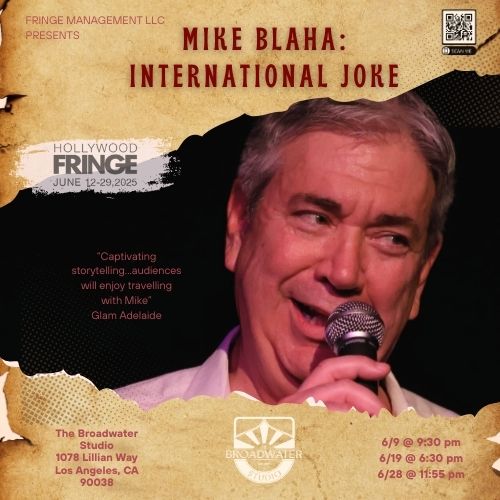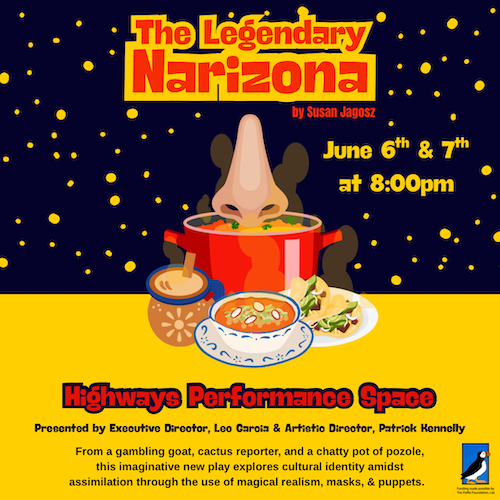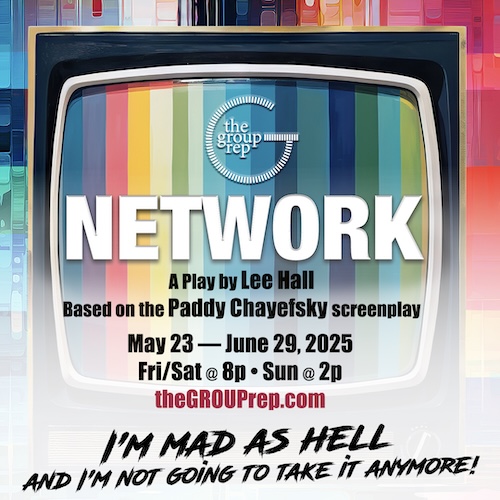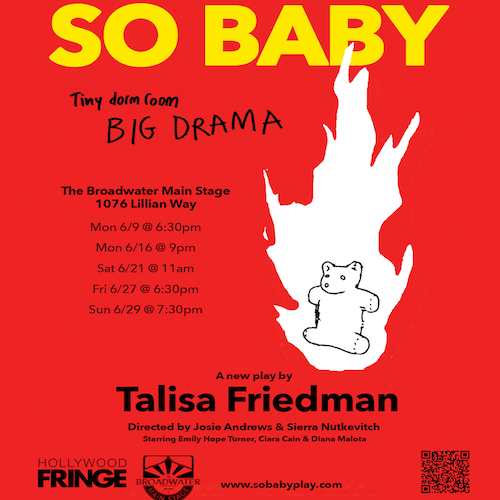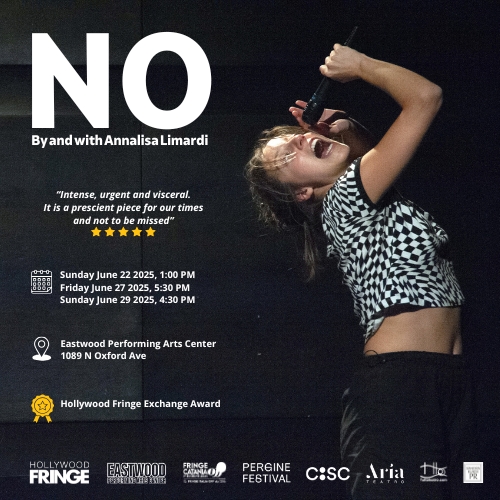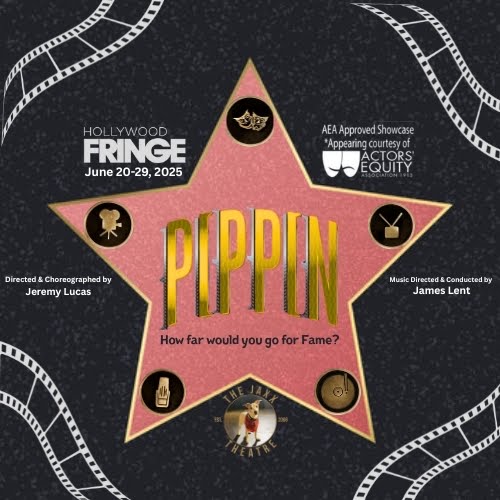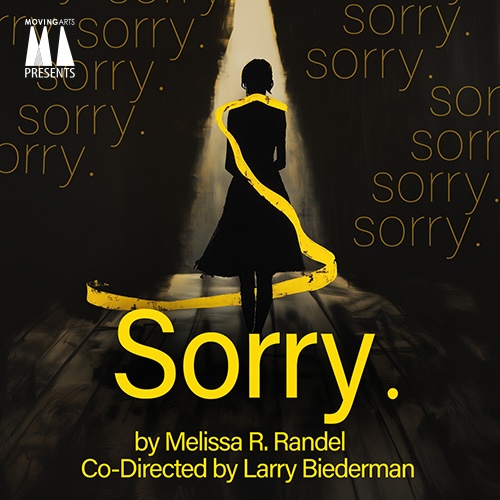
Ralph Cole, Jr. (Photo by Kelly Stuart)
Reviewed by Steven Leigh Morris
Playwrights Arena and the Los Angeles LGBT Center
Through April 21
RECOMMENDED
German author Franz Xavier Kroetz’s 1971 play, Request Concert, arrived in Los Angeles in 1986, presented by Ted Schmidt’s The Cast Theatre and directed by Michael Arabian. It featured a tour-de-force solo performance by one our luminary actors, Salome Jens, who remains with us at the age of 89.
The internationally heralded play-without-dialogue was an early sojourn into what was then called “environmental theater,” in that it took the audience inside the apartment of a woebegone stenographer, where the audience bore voyeuristic witness into this woman’s private life as she arrived home from work. It did so by following her through her nightly rituals of preparing dinner alone, and eating it, while listening to the radio. She also removed a stain from her dress, and eventually retired to bed, where she may or may not have planned her suicide. This was done all in real time, with no quick-cuts, or scene transitions punctuated by sound effects, or other devices of theatrical artifice contrived to create suspense. Socially, Kroetz’s play is also what today would be called “progressive,” in that it showed a consumerist culture in stark relief through the daily rituals that keep us sane and give our lives order and meaning (echoes of Eugene Ionesco’s The Bald Soprano and Samuel Beckett’s Happy Days) juxtaposed against the devastating loneliness and isolation within an entirely transactional society. It’s this loss of connection that drive us over the cliff of sanity — compounded by media (not social media then, but radio).
Almost 40 years after Request Concert’s Los Angeles debut, director Jon Lawrence Rivera has conceived and staged a work of environmental theater (misidentified as “immersive”), inspired by Kroetz’s play. Rivera’s version is called Swipe, it too has no dialogue, and it replaces Kroetz’s female stenographer with a male nurse. Throughout the run of this Playwrights’ Arena and Los Angeles LGTB Center co-production, four different actors (Ralph Cole, Jr.; Dan Guerrero; Reggie Lee; and Nick Salamone) alternate in the solo performance.
On the evening I attended, Cole, Jr. took on the role. (A breakdown of which actor performs in which performances can be found at https://playwrightsarena.org)
Set designer Leah Ramillano has converted an art gallery within in the Los Angeles LGBT Center into a replica of a caringly maintained L.A. studio apartment, wherein the audience of some two dozen sits in a single row wrapped around the perimeter of the apartment, which comes with a fully functioning shower at one end and a kitchenette (with a working microwave oven, stovetop and oven) at the other. Matt Richter’s lighting design minimizes theater instruments, relying instead on table and floor lamps — with the possible exception of a green neon-like glow seeping through the windows when they’re not shaded. Meanwhile the uncredited and particularly effective sound design includes not just the background hum of a vintage TV sitcom, but music coming from a record player spinning a vinyl disc, and hip hop temporarily blaring from the courtyard outside, an effect that is so authentic, it’s hard to discern whether or not this “interruption” of the nurse’s nightly rituals is by design. Add to that the offstage voices of somebody repairing the building’s elevator.
There was an entire genre of American and British plays from the 1920s on that aimed to capture with photographic/cinematic replication the lives of people dwelling behind prosceniums. The contrivance, of course, was the way these plays nonetheless adhered to artificial Aristotelian tensions that rose systemically until by Act 3 or Act 4, the audience was on the edge of its seat, awaiting the life-deciding/high-stakes decision of some protagonist. The bravery and the beauty of Kroetz’s play, and Rivera’s adaptation of it, is an almost belligerent disregard for such tension, so that we’re watching life pass the way life passes, sometimes against the soundscape of a television show or a recorded opera. Time itself is the protagonist. Without a word spoken, Rivera’s production is nonetheless poetry in motion.
There was a German performance artist from the 1970s who planted his audience in a gallery before a massive block of ice, and the point of the entire spectacle was for the “witnesses” to watch the ice melt, which took hours. It was reported by some audience members that after three hours of this, were there a window in that gallery, they would have thrown themselves out of it.
There’s a little of this in Swipe, but not much. In his 1986 L.A. Times review of Request Concert at The Cast Theatre, Dan Sullivan described how that production’s convention of replicating life passing, tested the audience’s patience, but only slightly. The same can be said of Swipe. Sullivan also noted that Jens’s performance in Request Concert was a master-class in capturing a character’s emotional inner-life, and that it should be studied by every student of acting. The same can be said of Cole, Jr.’s performance in Swipe.
This has to do with the quality of fastidiousness – the way Cole, Jr.’s nurse, an effeminate, slender Black man with a coif of silver-streaked hair, changes clothes, and folds the ones just worn; the hairnet worn in the shower; the placement of newly bought flowers on the kitchen table, the ritual of preparing a pan-fried fish dinner, the sprinkling of the herbs on the meat, the squeezing of the lemon (while the aroma of the cooking dinner wafts across the room, very much part of the experience); the sudden urgent placement of eye-spectacles on the nose in order to home in on the television screen across the room, on an ancient rerun of the sitcom, Leave It to Beaver which was produced from 1957 to 1963, though Swipe is set in the present.
Then there’s the rite of sitting down to dine at a perfectly prepared table, the relishing of the tastes, and then the ever so muted sigh of loneliness, that such a dinner is not being shared.
That TV episode (we just hear the soundtrack) features an amiable local policeman who visits the Cleaver household for an interview with “The Beaver,” a boy, accused of having broken a store window. When the policeman sees the boy, he understands that the kid has been wrongly accused, he doesn’t fit the description of the vandal. Whoever broke the window set him up. Who broke the window? his dad and the cop ask the child. You must know who it was. The Beaver doesn’t want to “rat” on his peer, even though that peer betrayed him. Ratting on a rat is not ratting, they explain. “In a democracy, everyone’s gotta work for the common good.”
The nurse watches all this through some free-floating haze of curiosity and apathy. Or maybe just depression.
He shuts off the TV, crosses to a phonograph, pulls out a vinyl album, and we hear the strains of Montserrat Caballe singing an aria from Verdi’s La Forza Del Destino. Against this grandiose musical background, the nurse stands in front of his couch toying with his cellphone. Without words being spoken, his hand gestures suggest that he’s on Tinder, a perception underscored by his taking a selfie and sending it. Against the backdrop of Caballe’s etherial voice, we also hear the swoosh of messages being launched, and the blings of messages being received. This all points in the direction of a pending liaison with another human being. The nurse’s body language becomes energized, urgent. A quick shower, a costume change (carefully considered by designer Mylette Nora), he removes a teddy bear from the bed. He puts condoms out onto a bedstand. And he waits.
All off this is in service of what the New York Times‘ Clive Barnes described in an early, New York production of Request Concert, as a “transition from the mundane to the hypnotic.”
While in the kitchen, the nurse stares at a portrait what one might presume to be his father. There’s another painting, or photograph, of what appears to be his younger self. The way he stares at it recalls a Bernie Taupin song lyric from the era when Request Concert was first produced:
“Let me drink deeply from the water and the wine
“Light colored candles in dark dreary mines
“Look in the mirror and stare at myself
“And wonder if that’s really me on the shelf.”
Playwright’s Arena and the Los Angeles LGBT Center, Hollywood. Fri.-Sat., 8 pm, Sun.-Mon., 7 pm; thru April 21.www.playwrightsarena.org or www.lalgbtcenter.org/events/ 90 minutes without intermission.


